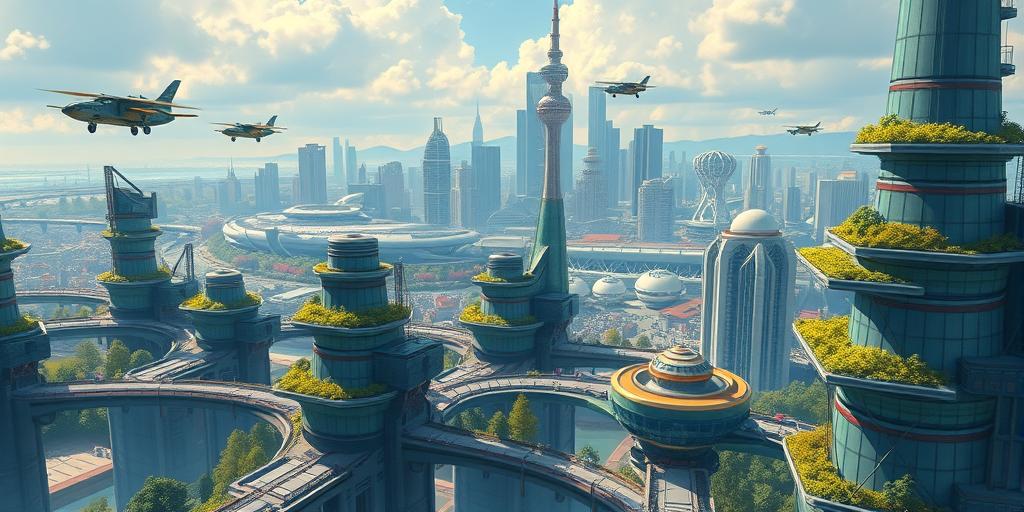Step into a world where climate change isn't just a headline, but a daily reality. Prepare to be amazed (or maybe a little scared!) as we peer into the crystal ball and unveil the potential lifestyle changes in 2025, all thanks to our warming world. Will flying become a luxury? Will our food choices be dictated by scarcity? Let's find out!
Transportation Transformation: The Future of Getting Around
The impact of climate change on our daily commutes is undeniable. Rising sea levels threaten coastal communities, while extreme weather events like floods and heatwaves disrupt transportation networks. This will inevitably lead to a shift in how we travel. Electric vehicles will become increasingly prevalent, not just out of a conscious choice but as gasoline becomes more expensive or unavailable. Public transportation, especially high-speed rail, will need to become significantly more efficient and reliable to replace a growing number of private car owners. Innovative solutions will emerge, including advancements in drone delivery and autonomous vehicles, possibly revolutionizing transportation in unexpected ways. Imagine autonomous buses weaving through smart city infrastructure, drastically reducing traffic congestion and emissions. But will this be available to everyone, or just the privileged few?
The Rise of Hyperlocal Living
As extreme weather events intensify, the concept of hyperlocal living will become critical. We'll see a resurgence in local farming, with community gardens and urban agriculture initiatives flourishing in response to disruptions to global supply chains. Preparing for potential supply chain disruptions is no longer a theoretical exercise, but a crucial aspect of personal resilience and community planning. This shift could lead to a greater sense of community, reduced reliance on long-distance transportation, and a more sustainable food system. However, will this be sufficient to deal with worldwide food shortages, exacerbated by climate change and other factors?
Food Security: The Plates of Our Future
The impact of climate change on agriculture is profound, affecting crop yields, livestock production, and food distribution networks. This will lead to changes in our diets. Expect to see a greater focus on plant-based diets, sustainable farming practices, and locally sourced food, which is why understanding the true cost of food—not just the price tag—will be more important than ever. The challenge will be to ensure food security for everyone, especially in vulnerable populations. Innovations in food technology, such as vertical farming and lab-grown meat, might offer solutions, but questions of affordability and widespread adoption will need careful consideration. Imagine a future where your meal's carbon footprint is displayed alongside the price and nutritional facts. How will this impact your eating choices? Will lab-grown meat become the norm or just a niche product for the eco-conscious elite?
Adapting Our Diets
Adapting to changing weather patterns will require versatility and resilience. What happens when the food we rely on becomes scarce or unavailable? We need to be open to trying new food sources and exploring alternative ingredients. This is where culinary creativity will step in, leading to innovative recipes and fusion dishes that incorporate locally sourced and sustainable ingredients. Imagine a future of diverse meals celebrating local produce rather than the homogenized food system of today. But will every country's population have the means to obtain and make such meals? How will communities adapt to changes in food availability?
The Changing Urban Landscape: Resilient Cities
Cities are on the frontline of climate change, facing increased risks from flooding, heat waves, and extreme weather. This necessitates a transformation of urban planning and infrastructure. We will see a move towards green infrastructure, sustainable building materials, and climate-resilient design. The focus will be on creating more walkable and cyclable cities, reducing our reliance on cars and promoting healthier lifestyles. Smart cities will leverage technology to monitor and manage resources efficiently, enhancing resilience to environmental changes. But this will require substantial investment and a fundamental shift in urban planning policies, and will it be possible to update infrastructure everywhere?
Green Infrastructure and Smart Cities
Green spaces will be more important than ever, acting as natural buffers against extreme weather events and providing opportunities for recreation and community building. Smart technologies will play a key role in monitoring environmental conditions and optimizing resource use. Imagine cities equipped with early warning systems for extreme weather events, using data to proactively mitigate risks. Yet even with these measures, it will only mitigate some of the threats, and a degree of planning and flexibility will always be needed.
The Future is Now: Embracing the Change
The lifestyle of 2025, shaped by climate change, will require adaptation and innovation. It presents challenges, but also opportunities to build more sustainable and resilient communities. Embracing this change, by focusing on renewable energy, sustainable agriculture, and community resilience, is not just about environmental responsibility; it's about securing a future where everyone can thrive. Let's get ready to create a better tomorrow, today! Make your voice heard, demand a greener future, and act now to leave a positive legacy for the next generation. Click here to discover how you can personally contribute to a more sustainable future!









